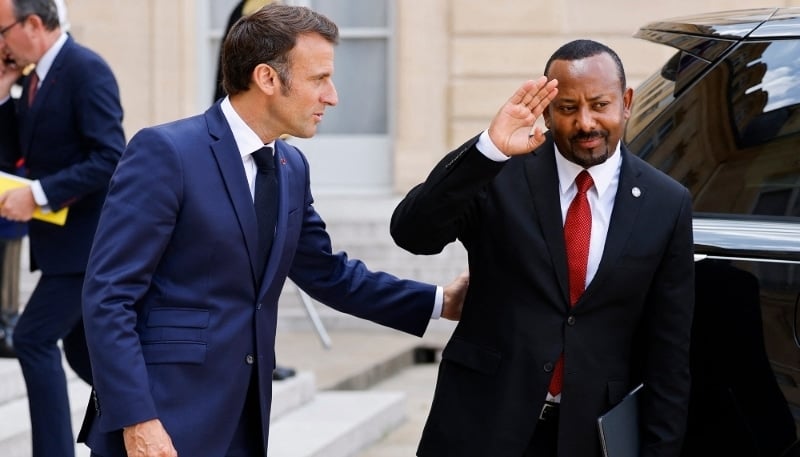
Background of Abiy’s European Tour
Purpose of the Tour
Understanding the purpose of Abiy’s European tour helps paint a clear picture of the intentions behind his travel agenda. It wasn’t merely a vacation; rather, a significant diplomatic mission aimed at strengthening international relations and expanding geopolitical alliances.
Initial Objectives
The initial objectives of the European tour were to foster diplomatic ties and seek economic partnerships. Abiy aimed to showcase Ethiopia as an emerging power in Africa, highlighting its potential as a viable partner in trade and investment. Additionally, discussions around climate change initiatives and technological collaboration were to be on the table, signaling Ethiopia’s commitment to global challenges.
Countries Planned to Visit
In his quest to enhance diplomatic relations, Abiy planned to visit several key European countries. The tour itinerary included engaging countries such as Germany, France, and the UK, known for their influence in the European Union and global trade. Each country was selected based on its bilateral potential and historical ties with Ethiopia, making them allies in various domains from development aid to security cooperation.
Reasons Behind Abiy’s Unfinished European Tour
Domestic Pressures from Ethiopia
Abiy Ahmed’s decision to cut short his European tour was not made lightly. Domestic pressures from Ethiopia played a significant role in this abrupt change of plans.
Political Environment in Ethiopia
A key factor was the political environment in Ethiopia. The country has been experiencing political turbulence, with ongoing power struggles and conflicts among different factions. These political challenges demanded Abiy’s immediate attention, necessitating his presence in Ethiopia. Amidst these pressures, it became increasingly difficult for him to stay away from the country’s pressing issues.
The severity of the domestic political scenario made it imperative for Abiy to return to Ethiopia, highlighting his commitment to addressing the challenges at home.
Public Opinion and Feedback
Another important factor was the public opinion and feedback. The Ethiopian public, already concerned about national stability, expressed unease about Abiy’s absence during such troubled times. Social media platforms and public forums were abuzz with discussions, critiquing the timing and purpose of his tour.
This strong public feedback put immense pressure on Abiy, compelling him to prioritize domestic responsibilities over international engagements.
Challenges Faced in Europe
While domestic pressures were mounting, challenges faced in Europe also contributed to the premature end of Abiy’s tour.
Diplomatic Setbacks
The European leg of the tour was met with several diplomatic setbacks. Not all countries were as welcoming as anticipated, with some holding back support or demanding clarifications on Ethiopia’s internal issues. These diplomatic hurdles diminished the effectiveness of Abiy’s objectives for the tour.
Such diplomatic snags made it challenging for Abiy to achieve the intended outcomes, weakening the potential diplomatic gains from the visit.
Logistical Hurdles
In addition to diplomatic issues, there were logistical hurdles that affected the tour. Planning international engagements is complex, with many moving parts, and unforeseen logistical challenges can arise. From travel disruptions to coordination issues, these logistical problems hindered the smooth execution of the tour.
Navigating these obstacles added to the overall difficulty of the tour, making it less productive and prompting a reconsideration of its feasibility.
In conclusion, the combination of domestic pressures and European challenges contributed to Abiy Ahmed’s decision to cut his European tour short, emphasizing the intricate balance between national and international political responsibilities.
Immediate Consequences of Abiy’s Return
Prime Minister Abiy Ahmed’s unexpected return from his European tour has ignited a flurry of reactions and potential consequences both on the international stage and within Ethiopia. By abruptly cutting his journey short, certain diplomatic relations and domestic political dynamics have been stirred up.
Impact on Diplomacy
The sudden return certainly raises eyebrows regarding Ethiopia’s international diplomacy. The broader implications for European relations and future diplomatic endeavors are worth exploring.
European Relations
Abiy’s brief and unfinished visit is likely to leave a significant mark on Ethiopia’s connection with Europe. The sudden cut to the trip could be interpreted as a diplomatic snub by some European countries, possibly complicating bilateral relations. The unfinished meetings and unfulfilled promises may lead to skepticism and reduce the trust needed for future collaborations.
Future Diplomatic Plans
The erratic change in schedule poses questions about Ethiopia’s future diplomatic strategies. Considering the setbacks faced, there’s an urgent need for reassessing their approach to global diplomacy. The Ethiopian government may need to reinforce its commitments and ensure transparency in its future endeavors with European nations. Building consistent communication and rebuilding trust will be essential in their diplomatic agenda.
Political Implications in Ethiopia
Back home in Ethiopia, Abiy’s decision to return early has sparked a storm within the political environment. The move has incited varied reactions across different sectors, particularly from the opposition and the public.
Reactions from Opposition
The Ethiopian opposition has seized upon Abiy’s unexpected return, interpreting it as a sign of instability or possible diplomatic missteps. They may use this opportunity to question the current administration’s ability to handle international affairs, pressing on issues related to national interest and governmental competence.
Public and Media Reactions
The Ethiopian public and media are abuzz with speculation surrounding the premature return. While some segments express concern over potential impacts on Ethiopia’s international standing, others wonder about the underlying reasons that necessitated such a return. Ethiopian media portrays a mixed picture, highlighting both the urgent domestic priorities that may have pulled Abiy back, and the possible implications for future diplomatic efforts.
News coverage, opinion pieces, and social media chatter are likely to shape the discourse in the coming weeks, as citizens analyze the government’s motives and decisions during this high-profile international tour.
Future Prospects for International Engagement
Prime Minister Abiy’s return home from his European tour undoubtedly opens a new chapter in evaluating and shaping Ethiopia’s international engagement strategies. With both the European and domestic landscapes in the backdrop, the future beckons a keen and strategic diplomatic play.
Revisiting European Diplomatic Strategies
The unfinished European tour calls for a close look at the diplomatic efforts that were underway. Ethiopia must reassess its approach to ensure future diplomatic endeavors achieve the desired outcomes.
New Diplomatic Approaches
Adopting new diplomatic approaches might be the key to reinvigorating Ethiopia’s standing on the European stage. While traditionally the focus might have been strictly governmental talks, introducing people-to-people connections, cultural exchanges, and economic partnerships can foster deeper relationships. Encouraging more open dialogues and understanding the cultural intricacies of each European nation can make Ethiopia’s diplomatic activities more effective and meaningful.
“An engaged bilateral relationship rooted in mutual respect and collaborative goals is the foundation for successful diplomacy.”
Potential Collaborations
Potential collaborations with European countries should focus on sectors where Ethiopia can offer unique value. Areas such as agriculture, renewable energy, and technology could be ripe for partnerships. Additionally, collaborating with European research institutions and universities could harness innovation and development for Ethiopia’s burgeoning avenue of self-reliance and growth. These potential ties need to be assessed with long-term benefits in mind.
Strengthening Domestic Support
While international relationships are vital, the domestic canvas shouldn’t be ignored. Strengthening domestic support is pivotal to ensuring that international engagements are not only externally successful but also internally accepted and celebrated.
Building Trust and Consensus
Building trust and consensus involves nurturing transparent communication channels with the Ethiopian populace. By involving civil society in discussions related to foreign policy and international engagements, the government can tailor its diplomatic strategies to reflect the people’s aspirations and concerns. Public consultations and participatory governance methods can bridge the gap between policy and populace.
Addressing Public Concerns
Addressing public concerns is another critical aspect of maintaining a robust domestic foundation for international engagements. The government must remain tuned into the sentiments of the public, ensuring that any diplomatic action resonates with the nation’s core values and interests. Regular updates about diplomatic missions and their potential benefits can help in managing public expectations and gaining widespread support.
“A strong nation begins with the unity and trust of its people; only then can it confidently extend its hand in friendship to the world.”
As Ethiopia navigates the complex web of international diplomacy, Prime Minister Abiy’s administration must balance both external ambitions and internal demands to successfully forge a path that benefits the country on all fronts.



